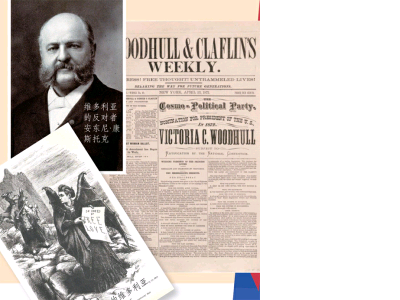传奇的维多利亚
2016-10-09
On 2 November 1872, three days before the nation went to the polls to elect its 19th president, one of the candidates was arrested. Two US deputy marshals, Colfax and Bernard, appeared early in the morning in Broad Street, calling at a nondescript shop front at number 48, around the corner from the imposing facade of the New York Stock Exchange. It was not their usual beat, but there they were, on a bitterly cold morning, trudging down Wall Street, to arrest a woman. Not even a prostitute or a thief—unless you believed certain newspapers. Nor was she a husband-poisoner or a pickpocket, but a woman of substance. For a woman to run for the presidency was a ridiculous idea, of course, but you had to admire her gumption1).

The deputy marshals were just in time. As they knocked at the door, a fast carriage swept past, but they could see the passenger was their woman, and gave chase. Stopping the carriage and producing a warrant, they arrested her on charges of sending obscene2) publications through the mail. The carriage was crammed with stacks of newspapers bearing the motto: PROGRESS! FREE THOUGHT! UNTRAMMELED LIVES! The suspect, Victoria Woodhull, was reported to be calm and cool in the face of capture. She and her younger sister, Tennessee (“Tennie”) Claflin, who was travelling in the carriage with her, were escorted away.
Hillary Clinton will make history in Philadelphia3) when she formally becomes the first woman to be the presidential nominee of a major party. But she is not the first woman to be nominated as a presidential candidate: That distinction is held by Victoria Claflin Woodhull. In 1872, she became a third-party candidate, running against the incumbent4) Republican president, General Ulysses S Grant, and his Democratic challenger, New York publisher Horace Greeley. She would not have been able to vote for herself—that right would not be granted to American woman for another 50 years—but that did not deter5) this pioneering feminist from making a historic bid for change.
The Journey to Running for President
Woodhulls journey to contesting the presidency had begun in 1871, when she was invited to Washington to address the house judiciary6) committee. Woodhull made a bold statement before the committee: “Women are the equals of men before the law, and are equal in all their rights.” The committee declined to agree with her position, but Woodhulls appearance brought her to national attention.
Woodhull ended her speech with a threat “If Congress refuse to listen and to grant what women ask, there is but one course left to pursue. What is there left for women to do but to become the mothers of the future government?”
Congress would not concede an inch7). And so on 9 May 1872, the National Woman Suffrage Association formed an offshoot, The Equal Rights Party. Woodhull was elected by the members to run for president. It was time for a dramatic new tactic: The nomination of Woodhull was a symbolic act of protest—the first of many to come.
Woodhulls presidential campaign was based on a platform far ahead of its time—it began with female suffrage8), but she also endorsed9) free love and an end to the “slavery” of marriage. She believed in workers rights and trade unionism, equal pay for men and women, and universal healthcare. In some ways, she was more Bill than Hillary: She excelled at public speaking and was praised, even by her detractors, as a charismatic campaigner.
Her call to action was published in Woodhull and Claflins Weekly, the paper she ran with her sister in New York for six years. The battle cry—“We advocate the rights of the Lower Million against the Upper Ten!”—would find an echo in the slogan of the Occupy movement10) more than a century later.
Being the Focus of Attention

Victoria Woodhull was subjected to intense personal scrutiny11) and judgment, of a degree that male candidates did not experience. There was an uproar12) in the press. The reporting of Woodhulls activities would, as with female politicians ever since, rarely fail to incorporate comments on her attire. Woodhulls much-critiqued style choices included a penchant for13) short skirts—to the ankle, that is. By comparison, there was less commentary on the fact that her age, 34, technically disqualified her from becoming president, since the constitution mandates a minimum age of 35.
Some of her fiercest critics were women, who feared that her unconventional lifestyle would detract from the seriousness of the womens rights movement. Harriet Beecher Stowe, whose 1852 anti-slavery book Uncle Toms Cabin was the bestselling novel of the century, was one such critic. Her novel My Wife and I, published in 1871, featured a character called Audacia Dangereyes. When Audacia runs for president, the female protagonist applauds her fathers assessment of her:
“No woman that was not willing to be dragged through every kennel, and slopped into every dirty pail of water like an old mop, would ever consent to run as a candidate … and what sort of a brazen tramp of a woman would it be that could stand it …? Would it be any kind of woman we should want to see at the head of our government?”
Woodhulls most zealous opponent, however, was the bewhiskered reformer Anthony Comstock, a United States postal inspector. He developed a plan to enhance his career by halting the progress of the first female candidate for president and destroying her reputation.
Her Road to Downfall
On 2 November 1872, three days prior to election day, Woodhull and her sister Tennie made a tactical decision that would bring about their downfall. They produced two incendiary14) stories for a special issue of The Woodhull and Claflin Weekly: New York preacher Henry Ward Beecher—a pillar of the community, a prominent abolitionist and the brother of Harriet Beecher Stowe—had adulterous affair with the wife of one of his long-term supporters; and Luther Challis—a prominent trader and Wall Street wolf, seduced two young girls.
The lurid articles provided Comstock with a convenient lever to secure his reputation and curry favor with15) donors for his crusade against obscene literature. Employing intermediaries, he ordered copies of the Weekly through the post, to trigger a warrant under legislation, issued for the sisters arrest, and they were soon apprehended16) by Colfax and Bernard, caught in the act of attempting to stop the authorities from confiscating copies of the offending edition.
The sisters were taken directly to the circuit court, where large crowds gathered outside, according to one observer, “wild with excitement.” In the courtroom, Claflin and Woodhull took their seats, heads held high. As the charges were read out, Victoria was said to look “grave and severe, never smiling and listening with apparent painful interest.”

The charge against them would be contested on the grounds of the first amendment—the right to free speech. The renowned advocate William Howe led the defence team. The prosecutor Noah Davis requested holding the sisters on a $10,000 bond, citing the gravity of their offences, not only against the obscenity law but also in the libelling of a leading citizen of good reputation. But the recorded charge was not libel. Beecher never refuted17) the story. Mark Twain would later call Beechers silence “a hundred-fold more of an obscene publication than that of the Woodhulls,” adding that he felt sure the nation would eventually realise that “there is fire somewhere in all this smoke of scandal.”
The judge ordered a bond of $8,000 and committed Victoria Woodhull and Tennessee Claflin in lieu of18) bail to the Ludlow Street jail, with a hearing on the case scheduled for two days later.
When the sisters arrived, the warden received them as if they were coming for tea, and graciously ushered them into his office. Inside the wardens office, the sisters met with Howe. He had formulated a plea that there was no basis for an obscenity charge because everything in the Weekly articles could be found in Shakespeare or the Bible.
19 November 1872, candidate Woodhull went back to the hearing room at the circuit court with her sister. When they arrived, they learned that a federal grand jury had already met and indicted19) them. They were remanded back into custody.
Woodhulls eventual share of the popular vote20) is undocumented (possibly because some of the polling stations discarded any ballot papers that favored her) but we know that she did not carry any states, and therefore won no electoral votes. Grant easily won a second term by a large margin.
The sisters were released on bail a month after their arrest, and exonerated21) of obscenity charges the following June, when the judge ruled that existing obscenity legislation did not apply to newspapers. But Woodhulls American career was over. She eventually emigrated to England. Woodhull ended her long and colourful life in 1927. A year later, British women won the right to vote.
The Pioneer of Womens Rights

History has reduced Woodhull to a footnote—a curiosity more than a contender—but, despite her penchant for melodrama, she was correct about her contribution: She set a vital precedent.
Thousands of Woodhulls suffragette sisters continued to fight against political bigotry. Finally, 136 years after Woodhulls arrest, we may soon see Hillary Clinton carry her baton forward into the White House.
As night fell on election day in 1872, Woodhull closed her campaign—from prison—with a prophetic letter to the editor of the New York Herald, which showed that she was very well aware of what she had begun:
To the public I would say in conclusion they may succeed in crushing me out, even to the loss of my life: But let me warn them and you that from the ashes of my body a thousand Victorias will spring to avenge my death by seizing the work laid down by me and carrying it forward to victory.

现在美国大选正如火如荼,希拉里有可能创造历史,成为美国第一位女总统。四个月前,获得民主党提名,成为首位代表主要政党角逐总统的女性时,希拉里表示要“在玻璃天花板上制造一条迄今为止最大的裂缝”。而在“最高玻璃天花板”制造裂缝的第一人其实是136年前的维多利亚·伍德胡尔。在美国女性还没有获得选举权的当时,她因竞选而遭遇了重重磨难,虽然最终竞选失败,但她无疑创造了传奇。
1872年11月2日,美国全体选民投票选举第19任总统的三天前,其中一位总统候选人被逮捕。两名联邦副法警——科尔法克斯和伯纳德——一早出现在百老汇大街,来到48号一间毫无特色的门店前喊了几声。这家店在纽约证券交易所气派的门面的拐角处。那里不是他们通常巡逻的地方,但他们却在这个寒冷刺骨的早上,沿着华尔街过来,为的是逮捕一个女人。这个女人既不是妓女也不是盗贼——除非你相信某些报纸的言论。她既不是毒杀亲夫的妻子也不是扒手,而是一位有影响力的女性。对于一名女性来说,参与竞选总统无疑是个荒唐的想法,但你不得不钦佩她的魄力。
这两个副法警来得很及时。就在他们敲门时一辆马车疾驰而过,但他们能够看到乘客就是他们要逮捕的女士,之后就展开了追捕。他们拦下马车,出具逮捕令,逮捕的理由是她被指控通过邮件寄送淫秽出版物。马车里塞满了成堆的报纸,上面写着这样的口号:要进步!要思想自由!要生活自由!据报道,面对逮捕,嫌疑犯维多利亚·伍德胡尔镇定而冷静。她和同乘一辆马车的妹妹田纳西(蒂妮)·克拉夫林一起被带走了。
希拉里·克林顿正式成为第一位获得主要政党总统候选人提名的女性时,她将在费城创造历史(编注:本文发表于2016年7月20日)。但她并不是首位被提名为总统候选人的女性,第一位是维多利亚·克拉夫林·伍德胡尔。1872年,她成了第三党派的总统候选人,与在职的共和党总统尤利西斯·辛普森·格兰特将军和他的民主党竞争对手——纽约出版商霍勒斯·格里利一同竞选。她无法为自己投票——50年后美国女性才获得了此项权利——但这并没阻止这位具有开创精神的女权主义者为改变现状而做出的历史性努力。
总统竞选之旅
1871年,伍德胡尔开始了竞选总统之旅。当时她被邀请到华盛顿向众议院司法委员会发表演讲。面对全体委员,伍德胡尔发表了大胆的声明:“法律面前男女平等,男女享有平等权利。”委员会拒绝同意她的观点,但伍德胡尔的表现引起了全国关注。
伍德胡尔以威胁的口吻结束了她的演讲:“如果国会拒绝聆听(女性的声音)、拒绝女性的要求,那女性就只剩下一条道路去追求——要成为未来政府的母亲。除此之外,女性还能做什么?”
国会一步也不退让。因此,1872年5月9日,全国妇女选举权协会成立了一个分支——平权党。党员们推举伍德胡尔竞选总统。是时候采取引人注目的新策略了:提名伍德胡尔象征着一种抗议,打响了抗议的第一枪,之后还会有许多这样的抗议行动。
伍德胡尔的总统竞选活动纲领非常超前,其首要主张是妇女选举权,同时也公开支持自由恋爱及结束婚姻中的“奴隶制”。她赞成工人的权利、工会制度、男女同酬及全民医疗保障。在某种程度上,她更像比尔·克林顿而非希拉里·克林顿:她擅长公众演讲,甚至她的诋毁者都称赞她是位有魅力的竞选者。
她的行动号召发表在了《伍德胡尔和克拉夫林周刊》上。她和妹妹在纽约共同经营了这份报纸六年。她的战斗口号——我们主张,相对顶层少数人,数百万底层人也应享有权利!”——一百多年以后,在占领华尔街运动的标语中仍能找到回应。
维多利亚·伍德胡尔的个人情况受到了密切的关注和评判,那种程度是男性候选人不曾经受的。媒体上一片喧哗。对伍德胡尔竞选活动的报道总是离不开对她服饰的评论。从此以后对女性政客的报道都是如此。伍德胡尔的衣着风格备受批评,包括她特别喜欢穿短裙,就是到脚踝的那种。相比之下,很少有人谈论她的年龄。事实上,她才34岁,严格来说,这个年龄没有资格成为总统,因为宪法规定最低年龄为35岁。
对她批评最激烈的人中有部分是女性,她们担心她标新立异的生活方式会减弱女权运动的严肃性。哈丽叶特·比切·斯托就是其中一位。斯托夫人在1852年出版的废奴小说《汤姆叔叔的小屋》是那个世纪的畅销书。她1871年出版的小说《我妻子和我》设定了一个主人公,名叫奥达西亚·丹吉艾尔。奥达西亚竞选总统时,这位女主人公非常赞同她父亲对她的评价:
“只要是一位不愿意被拉进狗屋、不愿像旧拖把一样被拖进脏水桶里的女人就不会同意作为候选人去竞选……能够忍受这个的女人又会是怎样一个厚颜无耻的荡妇呢?难道我们想看到任何一种女人领导我们的政府么?”
不过,伍德胡尔最狂热的反对者是长着络腮胡的改革家安东尼·康斯托克,一位美国邮政检查员。他制定了一个计划,阻止这个首位女性候选人的竞选活动进展并诋毁她的名声,以此来提升自己的职业生涯。
走向失败
1872年11月2日,选举日三天前,伍德胡尔和妹妹蒂妮做了个战略性决定,却导致了她们的失败。她们在《伍德胡尔和克拉夫林周刊》的特刊上发表了两篇具有煽动性的文章:一篇报道了社区的栋梁、著名的废奴主义者、哈丽叶特·比切·斯托的弟弟、纽约市牧师亨利·沃德·比切和一位他的长期支持者的妻子发生了婚外情;另一篇则揭露了著名股票经纪人、华尔街大鳄卢瑟·查利斯诱奸了两位年轻女孩。
这两篇骇人听闻的文章让康斯托克轻易地找到了把柄,借此巩固了自己的声誉,并讨好了支持他反对淫秽作品的捐款者们。在中间人的帮助下,他通过邮局订了几份周刊,以便依据法律促使当局发出逮捕这对姐妹的逮捕令。当姐妹俩试图阻止当局没收惹麻烦的报纸时,科尔法克斯和伯纳德就逮捕了她们。
姐妹俩被直接带到巡回法庭,法庭外聚集着大批的民众。据一位目击者称,民众“非常激动”。法庭内,克拉夫林和伍德胡尔坐在各自的座位上,昂首挺胸。宣读指控时,据说维多利亚看起来“严肃而沉着,没有一丝微笑,脸上明显带着痛苦却又关注的神情听着”。
围绕对她们的指控,双方根据宪法第一修正案——言论自由权——进行了辩论。知名律师威廉·豪带领被告辩护团队。检察官诺亚·戴维斯要求拘押两姐妹,保释金为一万美元,理由是她们罪行严重,不仅违反了反淫秽法,而且诋毁有影响力和良好声誉的公民。但记录在案的指控并不是诽谤罪。比切从未否认过那段情史。后来,马克·吐温称比切的缄默“比伍德胡尔姐妹的文章要淫秽一百多倍”。他还说,他确信国家最终会意识到“所有的丑闻都有其原因”。
法官规定保释金为8,000美元,然后把维多利亚·伍德胡尔和田纳西·克拉夫林关押在勒德洛街监狱,允许保释,并计划两天后听审此案。
两姐妹到达时,监狱长接待了她们,就好像她们是来喝茶一样,彬彬有礼地把她们带到了自己的办公室。在办公室里,两姐妹见到了豪。他已经起草了一份申诉,声称周刊文章里的内容都能在莎士比亚的作品或《圣经》里找到,因此,反淫秽罪的指控是毫无根据的。
1872年11月19日,总统候选人伍德胡尔和她的妹妹回到了巡回法院的法庭。到那里后,她们了解到联邦法庭陪审团已碰面并起诉她们。她们又被关押候审了。
伍德胡尔最终获得了多少普选票并无文件记载(也许因为一些投票站把投给她的选票全扔了),但我们知道她没有赢下一个州,因此也没有赢得任何选举人的选票。格兰特以压倒性票数轻松获得连任。
被捕一个月后,两姐妹获得保释。在之后的6月份,两人被免除了淫秽罪,当时法官裁定现行的反淫秽法不适用于报业。但伍德胡尔在美国的事业就此结束。最终,她移居到英国。1927年,伍德胡尔结束了自己漫长而多彩的一生。一年后,英国女性赢得了投票权。
争取女性权利的先驱
历史对伍德胡尔的记录少之又少,她更多地被看成一位奇人而不是一位总统竞选人——尽管她喜欢戏剧性事件,但她对自己贡献的评价是正确的:她开创了重要的先例。
成千上万与伍德胡尔一样争取妇女参政权的姐妹们从未停止过反抗政治偏见。最终,伍德胡尔被捕136年之后,我们也许很快就会看到希拉里·克林顿拿着她的接力棒进入白宫。
1872年选举日当晚,伍德胡尔在监狱里结束了自己的竞选。她给《纽约先驱报》的主编写了一封颇有预见性的信,表明她非常清楚自己开创的事业:
对于公众,我最后要说,也许他们成功地打败了我,甚至让我失去了生命。但我要警告他们,还有你,从我之后会出现成千上万的维多利亚,为我的死报仇,继续我开创的事业,走向胜利。
